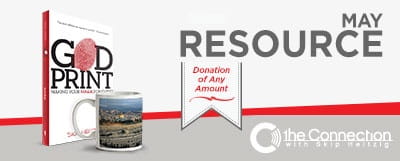May 27, 2016
The Power of the Tongue
By Skip Heitzig
Your tongue is one of the most important parts of your body. It's small, but you depend on it. Without your tongue, you wouldn't be able to speak or sing. I know for some that might be a plus, but for most it wouldn't be. Without your tongue, you wouldn't be able to taste or eat, because it's your tongue that directs the food in your mouth toward the throat, enabling you to swallow it.
But your tongue is also one of the most dangerous parts about you. James 3:5-6 says, "The tongue is a small thing, but what enormous damage it can do. A great forest can be set on fire by one tiny spark. And the tongue is a flame of fire. It is full of wickedness, and poisons every part of the body. And the tongue is set on fire by hell itself and can turn our whole lives into a blazing flame of destruction and disaster" (TLB). In Proverbs 18:21, Solomon went as far as to say, "Death and life are in the power of the tongue."
Whenever I said a bad word as a boy, my mom would take a bar of soap, bring me over to the sink, and shove that bar of soap in my mouth. She'd say, "I have to clean up your speech." I'm not going to forget that anytime soon!
It's estimated that the average person will open their mouth 700 times a day to speak. That's not how many words you speak, but you will open your mouth about 700 times. So we have 700 opportunities every day to get it right or to blow it badly. How can we make the most of these opportunities? In Colossians 4:6, Paul wrote, "Let your speech always be with grace, seasoned with salt"—filled with truth, but also with love. Let me share with you three kinds of speech to practice.
First, there's real prayer. It only makes sense if you're going to open your mouth 700 times a day that some of those times be directed upward to God. Part of real prayer is praying honestly. Honest prayer is better than dishonest piety, and God is able to sift through the rubble of even the gnarliest prayer and pick out the gems. The other part of real prayer is praise—the highest use of the tongue. So instead of using sharp words, use sanctified words. When you feel the urge to take God's name in vain, make God's name of value instead.
The second is regular petition. If you have an issue, pray about it regularly.James said, "No man can tame the tongue" (3:8). That implies that God is the only one who can tame it. Now, if that's true, then you should be asking God to help you T.H.I.N.K. before you speak: Is what you want to say true? Helpful? Inspiring? Necessary? Kind? The basic truth is that a closed mouth gathers no feet.
The third form of helpful speech is righteous rebuke. Psalm 141:5 says, "Let the righteous strike me; it shall be a kindness. And let him rebuke me; it shall be as excellent oil; let not my head refuse it." This is the ability to express love through tactful criticism, to warn a person. Solomon wrote in Proverbs 27:6, "Faithful are the wounds of a friend, but the kisses of an enemy are deceitful." A true friend will hold you accountable right to your face.
Note this: all words originate from the heart. Jesus said, "Out of the abundance of the heart the mouth speaks" (Matthew 12:34). So when my mom washed out my mouth with soap, it didn't cure the deeper problem.Words are like an outward gauge of what's going on inside of you. So what do your words say about you? Do you discourage and gossip and shock people, or do you encourage and add worship to God and inspire?
Copyright © 2016 by Connection Communications. All rights reserved.
For more from Skip Heitzig, visit ConnectionRadio.org,
and listen to today's broadcast of The Connection with Skip Heitzig at OnePlace.com.



